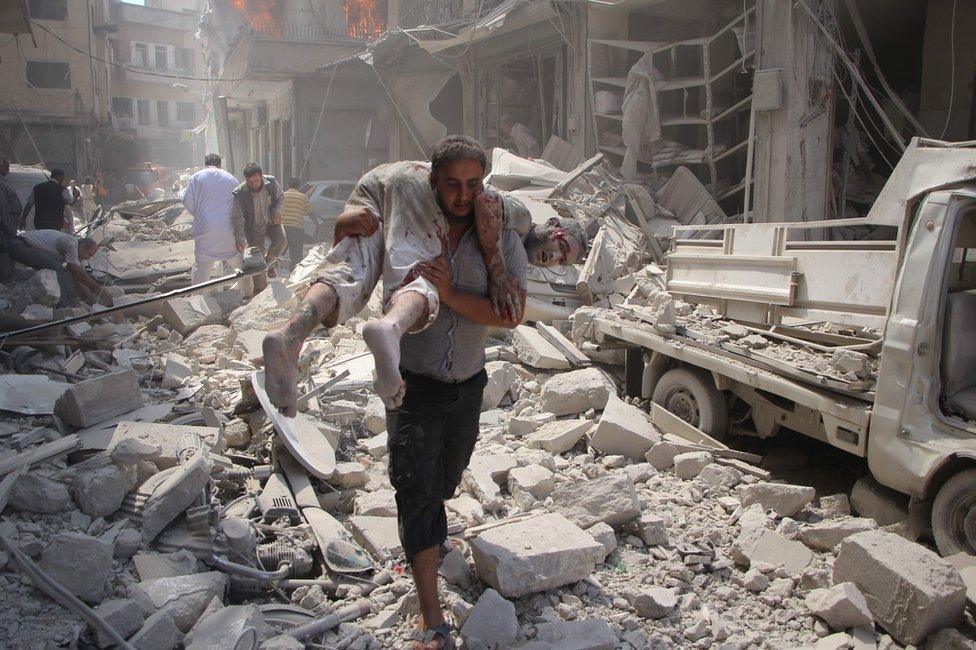Syria conflict: Bombs rain down as truce hopes rise
- Published
At least 20 people in rebel-held Idlib were killed, following an air strike on the market
Air strikes on rebel-held areas of Syria reportedly killed at least 100 people hours after the US and Russia announced plans for a truce.
An air strike on a market in Idlib killed up to 60 people while at least 45 died in strikes on Aleppo province, opposition activists say.
A 10-day truce is meant to start on Monday, followed by co-ordinated air strikes against jihadist militants.
Turkey and the EU welcomed the plan but warned that further action was needed.
Turkey said aid must be delivered from the very start while EU foreign policy chief Federica Mogherini looked towards a "political transition".
A spokeswoman for Syria's opposition said the plan provided some hope but more details were needed about how it would be enforced.
In the capital, Damascus, the government endorsed the deal, the state news agency Sana reported.
There has been no official reaction from Iran which, like Russia, is allied to Syrian President Bashar al-Assad.
The conflict in Syria, which began with an uprising against Mr Assad, has raged for five years and claimed the lives of more than a quarter of a million people.

The attack on Idlib also left scores wounded
Millions have fled abroad, many of them seeking asylum in the EU, but nearly 18 million people remain in Syria, which has been carved up by fighting between government and rebel forces.
When a busy vegetable market was targeted in Idlib, as many as 90 people were injured in addition to those killed, media and opposition activists say.
Some of Saturday's air strikes are believed to have hit the towns of Anadan and Hreitan near Aleppo, Syria's second city.
In other fighting:
Rocket attacks on government-held areas of the eastern city of Deir al-Zour by so-called Islamic State (IS) killed at least seven people, Syrian state media say
Israeli aircraft struck targets inside Syria after a projectile hit the Israeli-controlled part of the Golan Heights

Layers of conflict: Analysis by Jeremy Bowen, BBC Middle East Editor, Damascus

Getting a deal was an achievement, given the sour atmosphere between Moscow and Washington. It offers some fragile hope about stopping the slaughter.
But there is scepticism about its chances. That is because a lot is going to have to go right, quite quickly, if the agreement is to work. One necessity is President Assad's consent. A week-long ceasefire might be possible, but a political deal to end the war is still out of sight.
The Assad regime's survival depends on the Russians, so he will listen to them. But with Russia's help, the Assad regime is looking more robust. So it is hard to see why the president, or his Russian allies, would want him to go.
The war in Syria is made up of layers of conflict, which connect up to regional and global rivalries. That makes it very hard to calm, let alone end.

The truce is due to take hold at sunset on Monday, at the start of the Muslim holiday of Eid al-Adha.
Under the plan, Syrian government forces will end combat missions in specified opposition-held areas.
John Kerry: "If this arrangement holds then we will see a significant reduction in violence across Syria"
In an unexpected development, Russia and the US will then establish a joint centre to combat jihadist groups.
These include IS but also Jabhat Fateh al-Sham, the group known until recently as the Nusra Front, when it was allied to al-Qaeda.
The deal was reached in Geneva, Switzerland, between US Secretary of State John Kerry and his Russian counterpart, Sergei Lavrov.

If the truce holds...

Government forces have regained ground in Aleppo
Jihadist groups like so-called Islamic State and Jabhat Fateh al-Sham (formerly known as Nusra Front) face the joint might of the Russian and US air forces
Moderate rebels and civilians in the areas they hold will no longer face the threat of indiscriminate air strikes such as barrel-bombing although the Syrian air force will not be grounded completely; aid deliveries will be allowed to areas currently under siege
President Assad will be in a stronger position as the US and Russia engage two of his most effective military opponents while moderate rebels observe the truce with his forces

Mr Lavrov said only the Russian and US air forces would operate in areas designated for co-ordinated strikes but added that the Syrian air force could operate in other areas.
Welcoming the deal, Turkey, which launched its first major military incursion into Syria last month, said it was essential to halt fighting across Syria and deliver humanitarian aid to those in need "from the first day".
"The agreement... is very welcome," said Ms Mogherini, stressing that a UN proposal for a political transition would be "the starting point for resumption of the intra-Syrian talks".
Previous diplomatic initiatives have foundered on President Assad's refusal to give up power, leading to widespread scepticism about the latest initiative.

Syria's history of failed deals

Can Kerry (left) and Lavrov succeed at last?
February 2012: Syrian government "categorically rejects" an Arab League plan calling for a joint Arab-UN peacekeeping mission
June 2012/January 2014/January 2016: Three failed UN-sponsored peace conferences in Geneva
September 2013: Kerry and Lavrov negotiate a deal to strip the Syrian government of its chemical weapons in return for the US backing away from air strikes. Since then, the government has again and repeatedly been accused of using toxic chemicals against rebel-held areas
February 2016: World powers agree in Munich on a nationwide "cessation of hostilities" in Syria excluding jihadist groups. There is no agreement on any joint US-Russian operations. The "pause" quickly unravels as Assad promises to regain control of the whole country
March 2016: President Vladimir Putin declares "mission accomplished" in Syria and orders removal of "main part" of Russia's air army in Syria. Russian air strikes have continued ever since

